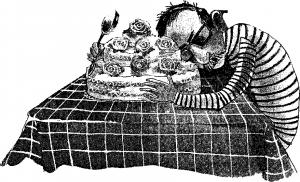Exercises on getting to know each other in German. Dialogues in German
Having become acquainted with the basics of German grammar, we will consider a basic set of phrases that will be useful in various communication situations.
After studying this lesson, you will learn how to say hello and goodbye in German.
Greetings
Like any other language, German has several ways to greet someone. You can say good morning or just say hello, or you can say a simple “hello.” The main thing is to remember who your interlocutor is and what kind of relationship you are in.
If you greet a stranger or people you are associated with business relations, then you can use the following phrases:
Guten Morgen[´gu:ten ´morgen] - Good morning. You can usually say this phrase before noon.
Guten Tag[´gu:ten ta:k] - Good afternoon. This phrase is used from noon to 6 pm.
Guten Abend[´gu:ten ´a:bent] - Good evening. This greeting is used after 6 pm.
Also in German there is a neutral greeting Hallo [halo], which means “Hello” and can be used in any situation. There is no analogue to the Russian word “hello” in the German language.
When meeting, in addition to greetings, you can also use a number of useful phrases or questions.
“Wie geht es Ihnen?”[vi gate es ´inen] - How are you (with you)? - do not forget that this question is formal.
"Geht es Ihnen gut?"[gate es ´inen gut] -Are you all right?
The answer to this question is the phrase: "Gut, danke."[gu:t ´danke] - Everything is fine, thank you.
Or phrase “Es geht mir sehr gut.”[es gate mia zea gut] - I'm fine.
Or: "Ziemlich gut."[´tsimlikh gu:t] - Good enough.
You can also use the phrase "Sehr erfreut."[zea er'froyt] - Glad to meet you.
To be polite and ask a question in return, use the phrase "Und Ihnen?"[unt ´inen] - What about you?
Remember that all of these phrases are very formal and are used in business communication situations.
In an informal communication situation, use analogues of the above phrases, namely:
"Wie geht es dir?"[vi gate es dia] - How are you (with you)?
This phrase in spoken German is often shortened to "Wie geht's?"[vi gates] - How are you?
The answer to this question could be the following phrase: “Es geht mir gut.”[Es gate mia gu:t] – I’m fine.
"Super!"[´zu:pea] – Excellent!
"Nicht schlecht."[nikht shlekht] - Not bad.
In response, it is customary to ask the question: "Und dir?"– [unt dia] - What about you?
As for pronunciation, remember that voiced g, b, d in German are pronounced voiceless, so in the word “guten” the first sound will be very close to the Russian sound “k”.
It is interesting to note that some parts of Germany have their own customized greetings. For example, greeting "Moin Moin!"[moin moin] or simply “Moin!” widespread in Northern Germany,
and the phrase "Grüß Gott"[grus goth] - in the South.
If you need to wish a person good night, phrases will help you "Schlaf gut"[shlaf gut] - Sleep well,
or "Gute nacht"[´gute nakht] - Good night.
Parting
The following phrases are used in German to end a conversation and say goodbye:
"Auf Wiedersehen!"[auf ´videa´zeen] - Goodbye! The shortened form Wiedersehen is used in informal communication.
"Auf Wiederhören!"[auf 'videa'khoren] - Goodbye! — This phrase is used if you are talking on the phone.
It is interesting to note that in the pronunciation in both of these phrases, the sounds [f] and [v] practically merge into one, so [v] weakens and is pronounced close to the sound [f]. The vowel sounds [i] and [e] are long, do not forget about this.
"Tschüss!"[chus] - Bye! — An informal farewell phrase.
If you want to sound more casual, phrases can help "Bis morgen!"[bis ´morgen] - See you tomorrow!
“Bis bald!”[bis balt] - Bye! See you soon!
"Bis dann!"[encore given] - See you soon!
A common form of farewell among teenagers and young adults is the phrase “Tschau/ciao!”- Ciao!
In some parts of Germany farewell is used Adieu![adyo] - Bye! This phrase was borrowed from French, which means “Go with God.”
What's your name?
To introduce yourself, you will need phrases such as:
Ich heiße…. [ihi ´haise] - My name is...
Mein Name ist….. [main ´na:me] - My name is… . This phrase can be used when you want to say only the first name, or the first and last names.
To give only the last name, the following phrases will help you:
Mein Vorname… [main ´foana:me]
Mein Familyname… [main fa´milienname]
If you are interested in the name of the interlocutor, you can ask the following questions:
Wie heißen Sie?[vi: ´haisen zi] - when addressing a person with “you”.
Wie heißt du?[vi: haist do] - when addressing a person using “you”.
Wie heißt ihr?[vi: haist ia] - when addressing a group of people using “you”.
If you have already been asked this question, and you want to show interest in return, you can use a short one:
Und Sie?[Unt zi] - And you?
Und du?[Unt doo] - And you?
Be prepared to be addressed politely as Herr/Frau (Mr./Madam) in Germany. Most often you will encounter this appeal at a hotel or airport/vocal. For example:
Sind Sie Frau Weiß?[sint si Frau Weiss] - Are you Mrs. Weiss?
You can answer in two ways:
- agree - Ja, ich Frau Weiß[I, ich bin Frau Weiss]. - Yes, I'm Mrs. Weiss.
- or disagree - Nein, ich bin Frau Schwarz[nein, ich bin Frau Schwartz]. - No, I'm Mrs. Schwartz.
Where are you from?
To say where you're from, use the following pattern:
Ich bin aus Russia. [ikh bin aus ´ruslant]. Ich komme aus Russland [ich kome aus Russland]. - I'm from Russia. Instead of a country, you can name a city or any other locality. To indicate the place where you currently live, use the verb wohnen. Don't forget about the person conjugation of this verb!
Ich wohne in Moscow[ikh vone in ´moskau] - I live in Moscow.
If you want to ask where your conversation partner is from or where they live, use these questions:
Woher commen Sie?[vo´hea komen zi] - Where are you from?
It is interesting to note that in the question word “woher” the part “her” can be moved to the end of the question, so that it turns out:
Wo kommst du her?[vo komst do hea] - Where are you from?
You can also use these phrases:
Sind Sie aus Morokko?[zint zi aus ma´roko] - Are you from Morocco?
Kommen Sie aus Italien?[´komen zi aus it´alien] - Are you originally from Italy?
Aus welchem Land kommen Sie?[aus welhem lant komen zi] - What country are you from?
Another question related to this topic - “Wo sind Sie geboren?”[wo zint zi ge´boren]
“Wo bist du geboren?”[vo bist do ge´boren] - Where were you born?/Where were you born?
The answer is the phrase “Ich bin in……. geboren"[ikh bin in….. ge´boren]. In the place of the gap, put the desired settlement, for example a city.
What is your phone number?
If you want to find out a phone number, then use the question “Wie ist Ihre Telefonnummer?”[vi: ist ´ire tele´fonnumea], when you address a person with “you”.
AND “Wie ist deine Telefonnummer?”[vi: ist ´daine tele´fonnumea] - if you communicate on “you”.
— Entschuldigung, wie spät ist es jetzt?
- Ich muss mich aber entschuldigen. Ich habe keine Uhr.
- Wissen Sie, Sie kommen mir irgendwie bekannt vor! Ich bin sicher, dass wir uns schon Mal gesehen haben!
- Ich habe keine Ahnung. Mir kommen Sie überhaupt nicht bekannt vor.
— Aber ihr Gesicht und Ihre Stimme kommen mir sehr bekannt vor! Oh! Ich glaube, ich habe mich genau erinnert, wo ich Sie gesehen habe.
— Ende Juni feierte der Bruder von meinem Nachbar Tobias seinen Geburtstag. Da wir uns gut kennen, wurde ich auch eingeladen. Auf dem Programm hatten wir auch eine Rheinschifffahrt. Ich bin jetzt 100%-ig sicher, dass Sie auch diesen Ausflug unternommen haben.
- Wahnsinn! Das stimmt! Ich war aber mit meiner Freundin unterwegs, die ich ewig lange nicht gesehen hatte. Deshalb passte ich schlecht darauf, was rundherum passiert. Wir hatten zu viele Themen zu besprechen.
— Und wir saßen im Schiffshinterteil und hatten eine freie Aussicht. Aber… Jetzt weiß ich, wo ich Sie zum ersten Mal gesehen habe. Aber Ihr Name ist mir bis jetzt nicht bekannt. Wie heißen Sie?
— Ich heiße Katharina. Und Sie? Wie heißen Sie?
— Sie haben einen wunderschönen Namen! Und ich heiße einfach Alex.
— Der Name Alex gefiel mir immer.
- Echt? Und mir schien es immer zu weitverbreitet.
Machen wir aber Schluss mit diesen unwichtigen Sachen. Vielleich trinken wir Kaffee irgendwo?
- Gerne, ich möchte schon lange etwas Warmes trinken.
— Ich kenne ein Cafe in der Nähe, wo guter Kaffee und frische Kuchen angeboten werden.
- Das klingt sehr gut, ich bin einverstanden! Und werden wir vielleicht duzen?
— Hier sind Kaffee und Kuchen.
- Danke, Alex! Was best du?
— Ich bin der stellvertretende Kaufmännische Direktor in einer Baufirma. Und was machst du?
— Ich studiere an unserer Akademie der Künste. Meine Fachrichtung ist Kunstgeschichte. Ich persönlich interessiere mich insbesondere für Malerei.
— Interessant, ich bin auch ein Kunstfreund und besuche oft verschiedene Gemäldegalerien. Ich würde gerne eine Gemäldegalerie mir dir zusammen besichtigen. Du könntest bestimmt etwas Interessantes und Unbekanntes erzählen.
- Ich liebe solche Ausflüge. Und ich erzähle immer gerne, was mir über die ausgestellten Kunstwerke bekannt ist.
— Wann unternehmen wir unseren ersten Ausflug?
- Ich bin an diesem Samstag frei. Wenn du auch Zeit hast, wäre es ideal.
- Ich finde Zeit an diesem Samstag. Bis 16.00 bin ich völlig frei. Um 17.00 muss ich in unserer Schwimmhalle sein, wo ich an einem für mich sehr wichtigen Sportwettkampf teilnehme.
— Was für ein Wettkampf ist es?
- Wasser-bzw. Turmspringen.
— Das ist aber auch eine große Kunst! Mir gefällt diese Sportart sehr gut. Darf ich auch mitgehen?
- Selbstverständlich! Es wird mich sehr freuen.
- Abgemacht! Hier ist meine Telefonnummer. Rufe mich bitte am Freitag an. Dann werden wir genau vereinbaren, wo wir uns treffen.
The following questions will help you learn more about the person you are talking to, as well as come up with an introduction dialogue in German... I give these questions with translation =)
Your task will consist of 2 parts:
- a) answer all these questions in German
- b) make up interview-dialogue getting to know each other in German, using these questions.
Wie heißen Sie? Wie ist Ihr Name?- What is your name? What's your name?
Wo wohnen Sie?— Where do you live?
Wo arbeiten Sie?- Where do you work?
Wann sind Sie geboren? — When were you born?
Sind Sie Deutsche?— Are you German by nationality?
Welche Ausbildung haben Sie?— What is your education?
Was haben Sie studiert?— What did you study? What did you study? (meaning at the Institute - for example, journalism)
Was sind Sie von Beruf? Was machen Sie beruflich?—What is your profession?
Sind Sie verheiratet?-Are you married?
Haben Sie Kinder?— Do you have children?
Welche Hobbys haben Sie?— What hobbies do you have?
Was machen Sie in der Freizeit gern?— What do you enjoy doing in your free time?
Welche Sprachen sprechen Sie?— What languages do you speak?
Warum müssen Sie Deutsch lernen?— Why should you learn German?
Interesting:
From this short dialogue you will learn what you can ask a person you don’t know well to maintain a conversation and how you can answer if they ask you questions.
Getting to know each other or establishing contact (Kontaktaufnahme) is a mandatory topic in which you need to focus when taking the exam at the Goethe-Institut for obtaining a B1 certificate.
Dialogue
What is your name?
– Wie heißen Sie?
My name is Peter Ivanov. What's your name?
– Ich heiße Petr Ivanov. Und wie heißen Sie?
My name is Maria Petrova.
– Ich heiße Marija Petrova.
Where are you from, Mr. Ivanov?
– Woher kommen Sie, Herr Ivanov?
I live in Ukraine (Russia or Russian Federation/Belarus/Kazakhstan)
– Ich wohne in der Ukraine (in Russland or in der Russischen Föderation/in Weißrussland/in Kasachstan)
What city do you live in?
– In welcher Stadt wohnen Sie?
I live in the capital of Ukraine - Kyiv (in the capital of Russia or the Russian Federation - Moscow / in the capital of Belarus - Minsk / in the capital of Kazakhstan - Astana)
– Ich wohne in der Hauptstadt der Ukraine – in Kiev (in der Hauptstadt Russlands or in der Hauptstadt der Russischen Föderation – Moskau/ in der Hauptstadt Weißrusslands – in Minsk/ in der Hauptstadt Kasachstans – in Astana)
Have you lived in Kyiv since birth or moved there?
– Wohnen Sie in Kiew von Geburt an oder sind Sie dorthin umgezogen?
I was born in Moldova, in the small town of N. When I was 7 years old, I moved with my family to Kyiv. Our relatives live in Kyiv.
– Ich bin in Moldawien, in einer kleinen Stadt N geboren. Als ich 7 Jahre alt war, bin ich mit meiner Familie nach Kiew umgezogen. In Kiew wohnen unsere Verwandten.
Do you have your own family?
– Haben Sie Ihre eigene Familie?
Yes, I have a wife and two sons, 4 and 7 years old
– Ja, ich habe eine Frau und zwei Söhne, 4 und 7 Jahre alt.
Where did you learn German?
– Wo haben Sie Deutsch gelernt?
I started learning German at school. In our class, German was the only foreign language.
– Ich begann Deutsch noch in der Schule zu lernen. In unserer Klasse war Deutsch einzige Fremdsprache.
Did you study German after school?
– Haben Sie Deutsch nach der Schule gelernt?
Yes, after school I studied German at university. German was my specialty there. After university I completed courses at the Goethe-Institut in German.
– Ja, nach der Schule habe ich Deutsch an der Universität studiert. Deutsch war dort meine Fachrichtung. Nach der Uni habe ich einen Deutschlehrgang am Goethe-Institut absolviert.
Have you been to Germany?
– Waren Sie in Deutschland?
Yes, I've been to Germany many times. As a tourist I traveled to Berlin, Frankfurt and Bonn. I also went on business trips to Germany.
– Ja, ich war in Deutschland vielmal. Ich bin nach Berlin, Frankfurt und Bonn als Tourist gereist. Ich hatte auch ein paar Dienstreisen nach Deutschland.
Have you been to other countries besides Germany?
– Waren Sie in anderen Landern außer Deutschland?
Yes, I have also been to some EU countries, Spain and the Czech Republic.
– Ja, ich war noch in einigen Ländern der Europäischen Union, in Spanien und in der Tschechischen Republik.
Have you been to countries outside the European Union?
– Haben Sie Nicht-EU-Länder besucht?
Of course, I was in Turkey, Georgia, Egypt, India, Thailand.
– Natürlich, ich war in der Türkei, Georgien, Egypt, Indien, Thailand.
What are you doing now?
– Wofür beschäftigen Sie sich im Moment?
I am currently working as a programmer in a large Ukrainian bank.
– Ich bin momentan als ein Programmierer bei einer großen ukrainischen Bank tätig.
Do you have a business card, Mr. Ivanov?
– Haben Sie eine Visitenkarte, Herr Iwanow?
Yes, please take it. Can I ask for your card?
– Ja, nehmen Sie bitte. Kann ich Sie um Ihre Karte bitten?
– Unfortunately, I didn’t take it with me. Please write down my phone number.
– Ich habe leider keine mitgenommen. Schreiben Sie bitte meine Telefonnummer.
Thank you very much for an interesting conversation!
– Vielen Dank für ein interessantes Geschpräch!
Mutually! I'm glad to meet you!
– Gleichfalls! Ich freue mich Sie kennen zu lernen!
In this note you will find various dialogues in German. After all, dialogues are nothing more than speech. Namely for her sake, for the sake of German speech– we make so much effort, learning and remembering rules, words, constructions.
Dialogues are movement, they are language in action.
This article contains several dialogues: in a restaurant, inspection of an apartment, telephone conversation, dialogue in a bakery.
By the way, you can easily compose dialogues in German yourself, based on phrases from my blog. For example, to compose a dialogue for a doctor’s appointment, you can look here. To visit a hairdresser, you will need a vocabulary to construct a dialogue from
Dialogue in a restaurant
Hello. Hier sind die Speisekarten, bitte. Darf ich Ihnen schon einmal etwas zu trinken bringen?– Greetings! Your menu, please. Can I get you something to drink now?
Ein großes Wasser bitte.– A large glass of water, please.
Und fur Sie?- And for you?
Eine Cola. Danke.- Coke. Thank you.
So. Haben Sie schon gewählt?- So. Have you already decided?
Ich hätte gern die Tomatensuppe. Gibt es Brot dazu?– I would take tomato soup. Is bread served with it?
Ja. Also einmal die Tomatensuppe. Und fur Sie?- Yes. That means one tomato soup. And for you?
Ich nehme den Frühlingssalat.- I'll take the spring salad.
Mit Huhn oder mit Fetakäse?– With chicken or cheese?
Mit Huhn, bitte.- With chicken, please.
Gern. Sonst noch etwas? – With pleasure. Anything else?
Nicht jetzt. Danke. – Not now. Thank you.
You will find additional phrases for this topic.
Inspection of the apartment
Guten Tag. Sind Sie Frau Meier?- Good afternoon. Are you Mrs. Mayer?
Ja. Familie Graf?- Yes. The Count family?
Ja. Danke, dass wir heute die Wohnung besichtigen dürfen.- Yes. Thank you for allowing us to inspect the apartment today.
Aber natürlich. Schauen Sie sich ruhig um. Wenn Sie Fragen haben, wenden Sie sich gern an mich.- Oh, of course. Look around calmly.
Eine schöne Küche haben Sie. Was von der Küche bleibt denn drin?– Your kitchen is beautiful. What kitchen items will stay here?
Die Schränke da oben gehören mir. Aber der Herd, die Spüle und die Unterschränke bleiben drin.– The cabinets are mine. But the stove, dishwasher and lower cabinets will remain here.
Und der Kühlschrank?- What about the refrigerator?
Das ist auch meiner. Aber ich könnte ihn gegen Abstand verkaufen. In meiner neuen Wohnung ist schon ein Kühlschrank. - He's mine too. But I could sell it to you. My new apartment already has a refrigerator.
An wie viel hatten Sie gedacht?- And for how much?
Ich denke 150 Euro wären ein fairer Preis. – I think 150 euros is a fair price.
Wie hoch sind Ihre Stromkosten pro Monat?– How much do you pay for electricity monthly?
Ich zahle jetzt 25 Euro und hatte auch noch nie eine Nachzahlung. Aber ich bin sehr sparsam und Sie auch zu zweit, da wird es vielleicht etwas mehr werden.– I now pay 25 euros and have never paid extra. But I’m very frugal, and there are two of you, so you’ll probably pay more.
Dialogues in German: in the bakery
Guten Tag! Und was bekommen Sie?- Good afternoon! What do you want?
Guten Tag! Drei Brötchen bitte!- Good afternoon. Three buns, please.
Wir haben Mohnbrötchen, Sesambrötchen, Vollkornbrötchen…“We have poppy seed buns, sesame buns, whole grain buns.”
Ganz normale bitte.– I’d like regular ones, please.
Fur 30 Cent?– Rolls for 30 cents?
Ja bitte. Und dann noch ein Mischbrot bitte.- Yes, please. And more bread made from different types of flour, please.
In Scheiben? – Slice?
Ja bitte.- Yes, please.
Und außerdem?- Anything else?
Noch zwei Stück Kuchen bitte.– Two more pieces of pie, please.
Das macht 8 Euro und 67 Cent.– From you 8 euros and 67 cents.
Telephone conversation in German
Guten Tag. Sprachenschule Barbarossa. – Good afternoon. Language school Barbarossa.
Guten Tag. Hier ist Anne Mandini. Ich habe gesehen, dass Sie einen Kurs für Konversation auf Deutsch anbieten. Wann beginnt der Kurs?- Good afternoon. My name is Anna Mandini. I saw that you offer a conversational German course. When does the course start?
Der nächste Konversationskurs beginnt nächsten Mittwoch.– The next conversation course starts next Wednesday.
Nein, nicht diesen Mittwoch. Erst in der Woche danach, am 22.- No, not this Wednesday. A week later, on the 22nd.
Und wie sind die Kurszeiten?– What are the course times?
Der Kurs dauert drei Wochen. Unterricht ist jede Woche von Montag bis Donnerstag, immer von fünf bis neun. – The course lasts three weeks. Lessons are held every week from Monday to Thursday, each time from five to nine.
Entschuldigung, ich habe Sie nicht ganz verstanden. Um wie viel Uhr ist der Kurs?– Sorry, I didn’t quite understand. What time is the course?
Er beginnt um 17 Uhr und geht bis 21 Uhr. Immer von Montag bis Donnerstag.– It starts at 17:00 and lasts until 21:00. From Monday to Thursday.
Ah, danke. Und wo findet der Kurs statt? – Thank you. And where will the course take place?
In der Realschule in Friedrich-Müller-Straße 56.– At the school on Friedrich Müller Street 56.
Vielen Dank. Dann möchte ich mich germen für den Kurs anmelden. - Thank you very much. Then I want to register for the course.
Gern. Das geht online, oder Sie können auch einfach bei uns vorbeikommen.- With pleasure. You can do it online or just come to us.
Ok. Ich komme morgen vorbei. Wiedersehen.- Fine. I'll arrive tomorrow morning. See you.
Explain the way to a random passerby
- Entschuldigen Sie, wie komme ich denn von hier am schnellsten zum Rathaus? – Excuse me, can you tell me the shortest way to the town hall?
- Zu Fuß oder mit dem Bus? – On foot or by bus?
- Zu Fuß. - On foot.
- Da gehen Sie am besten gleich hier durchs Kaufhaus durch, und hinterm Kaufhaus dann gleich links.– The best thing to do now is to go straight through the department store, and after the department store immediately to the left.
- Ok.- Fine.
- Die Straße dann einfach geradeaus, bis Sie übern Fluss kommen.“And then straight on until you cross the river.”
- Ok. Und hinter Fluss?- Fine. And after the river?
- Da sehen Sie dann einen Turm. Vorm Turm müssen Sie nach links, und dann sind Sie auch schon da.- There you will see a tower. Before the tower you need to turn left, and you are already there.
- Vielen Dank! Wie lange dauert das ungefähr?- Thank you very much. Approximately how long will this take?
- Ich denke, 15 Minutes.- I think about 15 minutes.
- Danke. Auf Wiedersehen. - Thank you. Goodbye.













